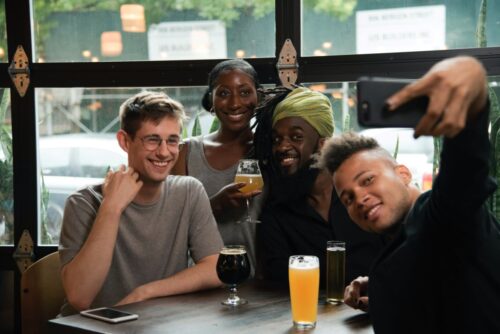Making a Connection: The Forgotten Joy of Finding Third Places
Making a connection and fostering relationships with others can often pose unique challenges for individuals on the autism spectrum. However, with thoughtful strategies and a supportive environment, it is possible to discover welcoming third places and forge deep, meaningful relationships with others.
So what are so-called “third places?”
Third places refer to social environments outside of the home and workplace that facilitate informal interactions and community engagement.
 These third places play a vital role in making a connection with others and expanding social networks. Examples include libraries, community centers, hobby clubs, cafes, or local parks. Recognizing the value of third places is crucial in the pursuit of meaningful relationships.
These third places play a vital role in making a connection with others and expanding social networks. Examples include libraries, community centers, hobby clubs, cafes, or local parks. Recognizing the value of third places is crucial in the pursuit of meaningful relationships.
The term third places was popularized by author Ray Oldenburg in his book, The Great Good Place (1989). He states that third places are important for establishing feelings of a sense of place and are important for civic engagement and civil society.
Finding the right third places for making a connection with others entails a thoughtful exploration of personal interests, hobbies, and passions. By engaging in activities that genuinely resonate with you, the likelihood of encountering like-minded individuals increases significantly. Take the time to explore community organizations, recreational groups, or volunteer opportunities that align with your interests.
For instance, if you possess a passion for painting, joining an art class or visiting local art galleries may serve as a promising starting point. If you are seeking making a connection – friendship or even a romantic relationship – finding third places that work for you is a successful way to get started.
Here are steps for getting started.
Finding Third Places for Making a Connection With Others
- Researching and Planning:
Before immersing yourself in new social environments, it is wise to conduct thorough research and gather pertinent information.Familiarizing yourself with the atmosphere, operating hours, and specific social activities or events of a given place can help boost your confidence and ease any apprehension.
Additionally, planning your visits during quieter periods may minimize potential stress associated with crowded spaces. - Utilizing Online Communities and Platforms:
In today’s digital age, online communities, forums, and social media groups centered around your interests can be invaluable resources.Engaging in these platforms allows for initial interactions and the formation of a virtual sense of community. By participating in discussions, sharing insights, and connecting with like-minded individuals, you can lay the groundwork for future face-to-face interactions.
- Attending Support Groups and Meetups:
Support groups and meetups specifically catered to individuals on the autism spectrum can provide a safe and understanding environment for forging connections.These gatherings offer opportunities to share experiences, gain valuable insights, and build relationships based on shared understanding. Seek out local autism organizations or consult with therapists and counselors who can provide recommendations for relevant groups in your area.
- Enhancing Social Skills:
Developing and honing social skills is essential in navigating social interactions and forming lasting connections. Seeking support from professionals specializing in social skills training for individuals with autism can be tremendously beneficial.These experts can provide guidance on effective communication strategies, navigating social cues, and managing sensory sensitivities. By investing in the development of social skills, you can approach social settings with increased confidence and ease.
- Engaging in Special Interest Groups:
Participating in special interest groups offers a unique opportunity to connect with individuals who share your passions. Whether it be a book club, gaming group, or sports team, these settings provide a fertile ground for cultivating friendships.The structured nature of these activities can help individuals with autism feel more comfortable and at ease while engaging with others who share their interests.
- Taking Part in Community Events:
Keep an eye out for local community events that cater to diverse interests and hobbies. Festivals, fairs, workshops, and other communal gatherings provide avenues for casual conversations and interactions.Attend events aligned with your interests and make an effort to engage with fellow attendees. Embrace the notion that small talk and initial conversations serve as stepping stones to deeper, more meaningful connections.
- Embracing Personal Growth and Self-Advocacy:
In the pursuit of meaningful connections, it is essential to embrace personal growth and engage in self-advocacy. Recognize and celebrate your unique strengths and qualities.Acceptance and confidence in who you are will radiate positivity and attract others who appreciate you for your genuine self. Engaging in personal growth activities, such as therapy, self-reflection, and self-care, can contribute to your overall well-being and enhance your ability to form and maintain relationships.
- Practicing Active Listening and Empathy:
Building strong connections requires active listening and empathy. Take the time to genuinely listen to others, showing interest and understanding in their perspectives and experiences.Practice empathetic responses and seek to understand their emotions and needs. By demonstrating empathy, you foster an environment of trust and mutual understanding, paving the way for deeper connections.
- Recognizing Boundaries and Consent:
Respecting personal boundaries and understanding consent are crucial aspects of developing healthy relationships. Be mindful of individual preferences, personal space, and social cues.Seek consent before initiating physical contact or sharing personal information. By demonstrating respect for others’ boundaries, you create an environment where trust and comfort can flourish.
- Patience and Persistence:
Forming connections takes time and effort, and it’s important to be patient with yourself and others. Not every interaction will lead to a lifelong friendship or romantic relationship, and that’s okay.Stay positive, be open to new experiences, and embrace the journey of building connections. Remember, relationships are built through shared experiences, mutual support, and genuine connection, so don’t be discouraged by setbacks or initial rejections.
- Seeking Support from Social Skills Groups or Therapists:
If you feel that your social skills could benefit from additional support, consider joining social skills groups or seeking guidance from therapists specializing in autism.These professionals can provide personalized strategies and tools to help you navigate social interactions and build stronger relationships. Through their expertise and guidance, you can develop new skills and gain confidence in your ability to connect with others.
- Celebrating Similarities and Differences:
In any relationship, it’s important to celebrate both similarities and differences. Embrace the uniqueness of individuals you meet, appreciating the diversity they bring to your life.By fostering an inclusive mindset and being open to different perspectives, you create an environment that encourages authentic connections and personal growth.
- Building a Supportive Network:
Surround yourself with a supportive network of friends, family, and mentors who understand and appreciate you for who you are.Cultivate relationships with individuals who uplift and encourage you, providing a sense of belonging and emotional support. This network can serve as a foundation from which you can venture into new social spaces and forge additional connections.
Third places are incredibly important; it’s where we talk to our friends, where we have fun, and where we enjoy life.
It’s sometimes a challenge in finding them in America, although it seems like they are still easier to find in Europe and Asia.

A lot of other people feel the same way; that’s why it falls to use to create our own third places and it can be amazingly liberating to do so.
Finding third places and building meaningful relationships may require some exploration and effort, but the rewards are immeasurable. By identifying suitable social environments, enhancing social skills, and practicing empathy, individuals with autism can nurture connections that bring joy, support, and a sense of belonging.
Remember, each connection you make is an opportunity for personal growth and a reminder that relationships can flourish in diverse and unexpected places.
Autism in Adults: Living, Learning, and Overcoming Challenges for a Fulfilled Life
Autism in adults requires additional support and coping skills to achieve independence in today’s world. Learn more about ways adults can live fulfilled lives and the challenges they face.
- 14 Practical Ways for Staying Motivated to Unlock Full Potential
- Autism and Independence: 7 Skills That Empower Individuals to Thrive
- Dangers of Social Media Addiction: How To Leave the Screens And Face the Real World
- Autism Volunteer Opportunities: 5 Ways Helping Others Fosters Acceptance
- 8 Heartfelt Ways Autism Emotional Support Animals Transform Lives
- Autism in the Future: Optimism for Improved Perception and Embracement
- Autism and AI: 7 Discoveries About the Surprise Pairing and Profound Impact
- Autism After High School: Is College the Next Step?
- Autism vs Asperger’s Syndrome: What You Need to Know
- Autism Disclosure: Is Revealing Your Disorder Helpful or Hurtful?
- Work and Autism: What Employers Should Know About Hiring People Like Me
- Drivers with Autism Can Achieve Success Behind the Wheel
- Exploring the Dark Side of Autism and Aggression
- Hope and How It Can Transform the Autism World
